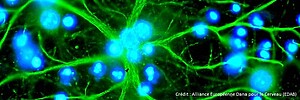Publication date: 12/03/18
ThemesNews
Brain Awareness Week was held in the first week of March, giving attendees an opportunity to investigate one of its little-known components: glial cells. We met with Frank Pfrieger, a researcher at the Institute of Cellular and Integrative Neurosciences (INCI), which seeks to unravel the mystery of these cells and their impact on the development of certain neurodegenerative diseases.
In his laboratory, Frank Pfrieger, director of research at the CNRS (National Centre for Scientific Research), is interested in the interactions between neurons and glial cells. More specifically, since 2001, he has been exploring the link between astrocytes (see box) and cholesterol, which is crucial in order for the brain to function properly. Understanding this link is essential in order to treat certain neurodegenerative diseases such as Niemann-Pick Type C, which can lead to the death of sufferers before the age of 10 in its most severe form.
"During our work, we tried to find out what synthesises cholesterol in the brain. One of the hypotheses is that astrocytes make cholesterol for the neurons and deliver it. With this in mind, we came across Niemann-Pick Disease." This genetic neurodegenerative disease is the result of a mutation in one of the two proteins responsible for the redistribution of cholesterol within cells. When they fail, cholesterol builds up. "The question is why this build-up leads to the death of certain neurons and the specific neurological symptoms encountered", says Frank Pfrieger.
















